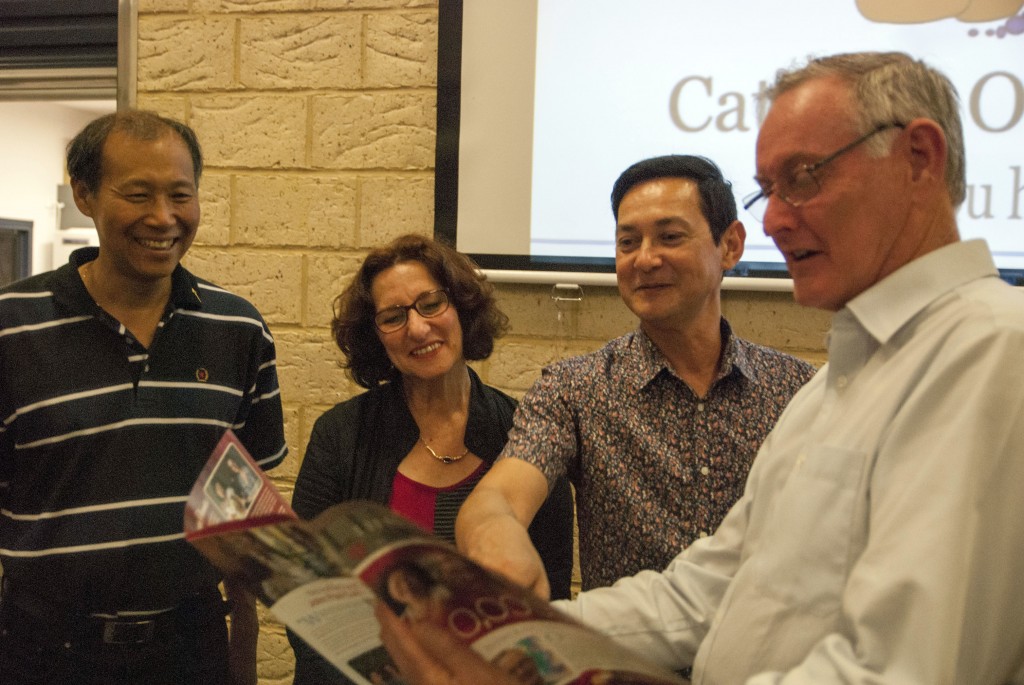
By Marco Ceccarelli
Catholic Outreach’s pastoral care programs are gaining momentum in Perth as Director Peter Mc Minn and Outreach Officer Betty Thompson introduce the benefits of the LifeLink-sponsored agency to more parishes within the Archdiocese.
With 25 parishes already endorsing Catholic Outreach, St Emilie de Vialar in Canning Vale became the latest parish seeking to establish a program that enables volunteers to provide short-term emergency care for people in need within the community.
During an information evening held on 20 October, aimed at recruiting coordinators and volunteers, Mr Mc Minn introduced to a revamped St Emilie’s Parish Council and interested parishioners the aims and objectives of Catholic Outreach.
“Within a parish, there are often many jobs that cannot all be done by parish priests alone,” Mr Mc Minn said.
“Jobs, such as offering emergency transport to someone who needs to be taken to the hospital, to the doctor or simply to do the shopping; or preparing a meal for a person who cannot cook for themselves at a specific moment in time: this is where the Catholic Outreach programs can help,” he added.
Mr Mc Minn went on to explain that other jobs such as gardening, home help, visiting and bereavement support also fall under the banner of “practical support” offered by the volunteers who adhere to the Catholic Outreach structure. He also informed attendees that, if a particular job is not suited to the capacity of volunteers, it can be referred to other Archdiocesan or government agencies.
“Coordinators assess a particular situation, look at the contact list and go to a volunteer to check for availability. If, for example, a coordinator sees that a job is more suited for the St Vincent de Paul Society, he or she can refer a person to that agency,” he said.
Catholic Outreach care programs are managed on a daily basis by a small number, of approximately six people, of coordinators whose role is to correspond with volunteers about the various jobs that require attention.
Mr Mc Minn emphasised that volunteering does not have to be a life-long commitment, as parishioners are invited annually or every two years to recommit to, or withdraw from, the care program.
“If you say you are happy to do an emergency meal, it does not mean that every Friday night you will be cooking a meal. It could be two to three times a year.
“However, in a year’s time, when the recommitment comes up, your circumstances may have changed and you can either state that you no longer have time to do a specific job or that you would like to do more.
“For instance, if you are enjoying giving lifts to people and suddenly have more spare time, you may decide that you can provide both transport and visit someone who experiences ongoing solitude,” he said.
Mr Mc Minn and Ms Thompson went on to take questions from the audience and made themselves available to further discuss any issues after the presentation.
Catholic Outreach provides ongoing training and formation for coordinators, including educational training days, newsletters, conferences, retreats and access to a secure area of the Catholic Outreach website with downloadable templates and reference policies and procedures.
Volunteers are also kept up to date via orientation briefings.
To introduce a Pastoral Care Program in your parish and find out more about Catholic Outreach, visit www.catholicoutreach.org.au.
LifeLink agencies collectively touch the lives of more than 31,000 people in need each year through the provision of accommodation, food, clothing, financial assistance with electricity and gas accounts, and the protection of women and children escaping domestic violence and abuse.
In this year’s Christmas LifeLink Appeal, the Archbishop is setting a target of $700,000 so as to help fund agencies in being able to meet the needs of those who knock on the doors of Archdiocesan agencies.
The 2015 LifeLink Christmas Appeal will be officially launched in parishes on 14 and 15 November.
To donate to LifeLink, go to www.lifelink.com.au.